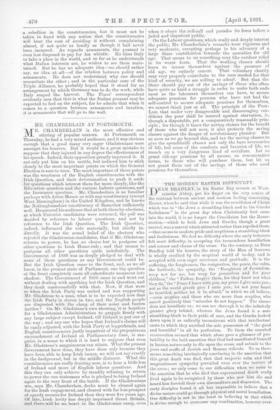MR. CHAMBERLAIN AT PORTSMOUTH.
"Vr R. CHAMBERLAIN is the most effective and stirring of popular orators. At Portsmouth on Thursday, he had a very mixed audience, and it was obvious enough that a good many very eager Gladstonians were amongst his hearers. But it would be a great mistake to suppose that they injured in any degree the effectiveness of his speech. Indeed, their opposition greatly improved it. It not only put him on his mettle, but induced him to stick closely to the most important points on which the General Election is sure to turn. The most important of these points was the weariness of the English constituencies with the Irish Question, and their determination to push it aside for questions which interest them far more deeply, like the Education question and the various Labour questions, and the Insurance question. Mr. Chamberlain is as familiar perhaps with Aston Manor as with any constituency (except West Birmingham) in the United Kingdom, and he knows the Nottinghamshire constituency of Bassetlaw sufficiently well. Reassured his audience that at both these by-elections, at which Unionist candidates were returned, the poll was decided by reference to labour questions, and not by reference to the Irish Question. The Irish Question, indeed, influenced the vote materially, but chiefly in- directly. It was the sound belief of the electors who rejected the Gladstonian candidates, that if Mr. Gladstone returns to power, he has no choice but to postpone all other questions to Irish Home-rule; and that means to postpone all other questions quite indefinitely. The Government of 1886 was as deeply pledged to deal with some of these questions as any Government could be. But the Irish Question came to the front, and, as we all know, in the present state of Parliament, one big question at the front completely casts all subordinate measures into shadow. The Government of 1886 came in and went out without dealing with anything but the Irish Question, and they dealt unsuccessfully with that. Now, if that were so when the Irish Party was united and was supporting Mr. Gladstone to a man, what is to be expected now that the Irish Party is cloven in two, and the English people are disgusted with the clang of their noisy and barren battles ? On Mr. Gladstone's own showing, it is hopeless for a Gladstonian Administration to grapple firmly with any large subject except Ireland, till Ireland is put out of the way ; and any one who hopes that Ireland's claims will be easily adjusted, with the Irish Party at loggerheads, and English constituencies justly impatient of the preposterous encroachment of Ireland on Parliamentary time, is san- guine in a sense to which it is hard to suppose that even Mr. Gladstone's sanguineness can attain. What the present Government have done, they have done only because they have been able to keep Irish issues, we will not say exactly in the background, but in the middle distance. What the constituencies are really desiring now, is to hear a little less of Ireland and more of English labour questions. And this they can only achieve by steadily refusing to return to power the one statesman who is pledged to bring Ireland again to the very front of the battle. If the Gladstonians win, says Mr. Chamberlain, decks must be cleared again for the Irish engagement, and cleared with far less prospect of speedy success for Ireland than they were five years ago. Of late, Irish levity has deeply impressed Great Britain, and, there will be no heart in. the Gladstonian camp, even when it obeys the roll-call and parades its force before a jaded and impatient public. On the Labour questions, which really and deeply interest the public, Mr. Chamberlain's remarks were vigorous and very moderate, excepting perhaps in his advocacy of a large State contribution towards the annuities for old age. That seems to us something very like outdoor relief in its worst form. That the working classes should learn to insure themselves against the pressure of old age, we entirely concur. That voluntary charity may very properly contribute to the sum needed for that kind of security, we are willing to admit. But that the State should pay out of the savings of those who often have quite as hard a struggle in order to make both ends meet as the labourers themselves can have, to secure adequate pensions for persons who have not had the self-control to secure adequate pensions for themselves, we cannot think just at all. The principle of the Poor- Law, that under very disagreeable and discouraging con- ditions the poor shall be insured against starvation, is, though a disputable, yet a comparatively reasonable prin- ciple; for though it taxes the saving classes for the benefit of those who will not save, it also protects the saving classes against the danger of revolutionary plunder. But so soon as we go beyond this, and tax the saving classes to give the spendthrift classes not only the bare necessaries of life, but some of the comforts and luxuries, of life, we trench on a very dangerous kind of socialism. Let us grant old-age pensions by all means, on remunerative terms, to those who will purchase them, but let us not grant them out of the savings of those who need pensions for themselves,






































 Previous page
Previous page